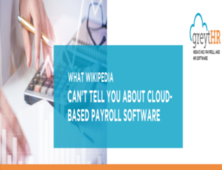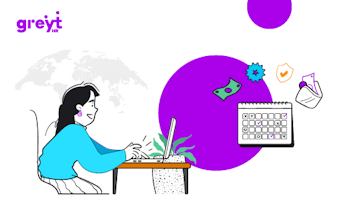What is so strange about cloud-based payroll management software that Wikipedia does not have too much information about it? Many organisations use this software today and have gained a lot from it. Yet, not much information is available. The wiki may tell you that cloud computing would mean accessibility of data and information from anywhere at any time. Valid to some extent, but how is the question.
Perhaps many are of the impression that cloud-based software’ are meant only for fast-paced processes like sales forces or stock markets who might need instant and constant information from many sources simultaneously and, most importantly, on a real-time basis.
So, how different is it from internal functions such as HR or Payroll? Though they are internal to an organisation, both these functions complement each other closely and share the most crucial information of employees and their data.
The Functions and Goals of HR and Payroll
Until recently, every HR process - to the maximum possible - had to be on a batch-processing mode. New employees had to join only on Mondays, and induction had to happen only on Tuesdays, Bank documentation on Wednesdays only, data to downstream systems or departments like Payroll or IT support / Security, etc., had to be provided on Thursday, so on and so forth. If you miss this timeline, one had to wait another week! In this fast-paced and fast-food era, just imagine the impact of one week of delay in the entire business chain in terms of delayed resources, skill, time, and opportunities.
Secondly, each internal function proudly owned their stand-alone systems - such as one for HR, one for Payroll, one for Accounting, etc. These systems do not talk to each other. The same data had to be fed multiple times individually into each system by the respective departments.
Cloud payroll software features has genuinely helped overcome this constraint and has helped to bring in the business’s continuity in the real sense.
Some essential points that will bring clarity to the new concept.
Imagine a Manager who needs to hire a skill on a very urgent basis. Their organisation has already installed cloud-based HR software and have been using it for some time, forward and far-sighted. The Manager logs into the HR portal and updates the requirement in terms of skill needed, experience, location, etc. The system automatically notifies the recruitment team or impaneled talent consultants who have access to the portal from wherever they are located. If a match is found, then the Manager and Recruitment team is notified of the next steps. If found suitable, the candidate is notified via the portal itself.
In the event candidate joins, the employee data, joining data, and compensation details will be fed into the system by HR as a one-time entry. The same data automatically flows into other programs such as payroll, IT support, Admin, Finance, Security, external benefit providers or agencies, statutory tables, etc. Candidates can join an organisation at multiple locations of the organisation or even from home during work from home situation.
In simple terms, cloud payroll management software can best be described as ‘one system, one program, one data, multiple users, multiple locations, instant information.’
Cloud software helps avoid risks, errors, or fraud, and most importantly, it supports data integrity, security, and maintenance. If you are scouting for the best HR and payroll software, read on. greytHR, a popular and well-established cloud HR & payroll software, supports many organizations across industries.








